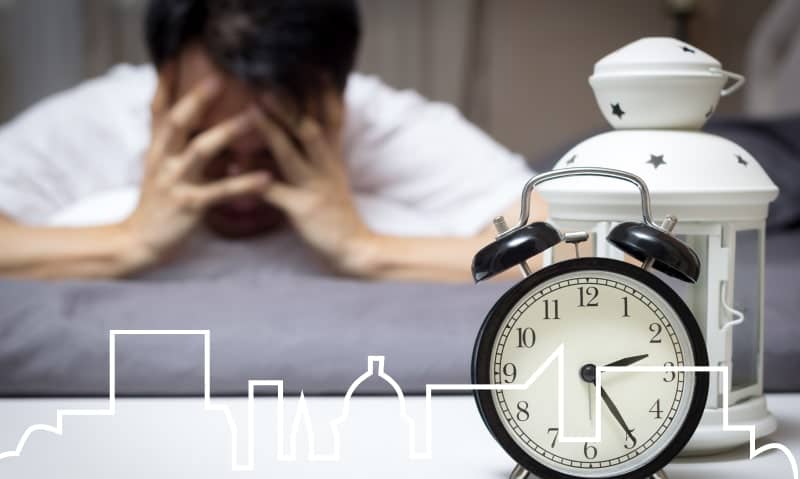Sleep Apnea Symptoms: 9 Signs You May Have It!

Did you know that the average adult requires approximately seven to nine hours of sleep per night? According to the Sleep Foundation, a good night’s sleep is essential to be at your best both mentally and physically. When we don’t get enough sleep, it can increase your risk of developing high blood pressure, diabetes, heart attack, heart failure, or stroke.
Not only that, but those with chronic sleep deprivation are more likely to be obese, suffer from depression, have a reduced immune system function, and a lessened interest in intimacy. But do you know what is causing your sleep deprivation? Read on to learn if you are one of the 22 million American adults suffering from sleep apnea.
Do you have sleep apnea?
It’s not uncommon for signs of sleep apnea to be mistaken for other health concerns. However, if you have one or more of the following symptoms and don’t think you are getting enough sleep, it is time to pay a visit to your physician or dentist near Boise, Idaho, for help. Check out this list of 9 signs that you may be suffering from sleep apnea.
- Loud snoring—If you snore, you may be waking yourself up throughout the night. This isn’t only bad for you; it isn’t that much fun for your bed partner either.
- Intermittent breathing—If you are waking up tired, ask your bed partner to check on you throughout the night to watch for signs of paused breathing.
- Dry or sore throat—A dry or sore throat isn’t always a sign of sickness. It could be an indicator for the presence of sleep apnea.
- Shortness of breath upon waking—This is seen more in central sleep apnea. If you wake up short of breath, it is an indicator that something is going on.
- Irritability—We all know what it is like when a child is overtired. But an overtired adult is no different. You need to get an adequate amount of z’s at night to function productively and positively throughout the day.
- Restlessness in bed—If you feel like you just can’t get settled comfortably into bed, it isn’t necessarily an indicator that you need a new mattress or sheets with a higher thread count. Restlessness in bed is often directly related to sleep apnea.
- Daytime sleepiness—Being sleepy during the day is no good. Not only is it dangerous for you to operate a motor vehicle, or even to prepare a meal at home, but it can impact your professional life and personal relationships too.
- Morning headache—A headache when you wake up doesn’t necessarily mean that you consumed a few too many tasty adult cocktails the night before. So if you are waking up with a headache each morning and know it isn’t related to a night out on the town, it is time to seek medical or dental attention.
- Frequent nighttime urination—Though frequent nighttime urination can be an indicator of other health issues, research by SleepApnea.org indicates that “over 84% of patients with sleep apnea reported frequent nighttime urination.”
What are the risk factors for developing this condition?
Understanding if you are at a greater or lesser risk for developing sleep apnea is also essential. And many factors can increase your risk of developing obstructive sleep apnea, including the following.
- Obesity
- Age 60 or older
- Family history
- Gender (Men tend to suffer from sleep apnea more than women.)
- Small airways or a physical misalignment in the nose, throat, or upper airway
- Allergies
- Enlarged tonsils
- Tobacco usage, especially smoking
- Medical conditions, including diabetes, or history of stroke or heart failure
If you have one or more of the above risk factors and are experiencing one or more of the signs we listed, now is the time to reach out to your doctor or dentist. If you are diagnosed with sleep apnea, your doctor may start by prescribing continuous positive airway pressure (CPAP) therapy.
And if that doesn’t work for you, a qualified dentist such as Dr. Staley at Staley Dental can create a customized appliance for you to reduce your snoring and improve your sleep. This oral device works without the inconvenience of a loud, bulky machine. We refer to this as oral appliance therapy (OAT), and it has been a game changer for other patients trying desperately to get a better night’s sleep. We’re confident that it could help improve your health and quality of life too.
Contact Staley Dental for relief from your sleep apnea.
If you are ready to get a better night’s sleep and you have exhausted (pun intended) other efforts, now is the time to request an appointment with Staley Dental: your dentist near Boise, Idaho. We’ll start with a consultation to understand your concerns, and we’ll then work together to get you on a path to better sleep. What are you waiting for?